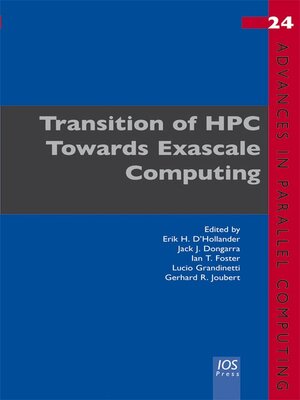Transition of HPC Towards Exascale Computing
ebook ∣ Advances in Parallel Computing
By Erik H. D′Hollander

Sign up to save your library
With an OverDrive account, you can save your favorite libraries for at-a-glance information about availability. Find out more about OverDrive accounts.
Find this title in Libby, the library reading app by OverDrive.



Search for a digital library with this title
Title found at these libraries:
| Library Name | Distance |
|---|---|
| Loading... |
The US, Europe, Japan and China are racing to develop the next generation of supercomputers – exascale machines capable of 10 to the 18th power calculations a second – by 2020. But the barriers are daunting: the challenge is to change the paradigm of high-performance computing.
The 2012 biennial high performance workshop, held in Cetraro, Italy in June 2012, focused on the challenges facing the computing research community to reach exascale performance in the next decade. This book presents papers from this workshop, arranged into four major topics: energy, scalability, new architectural concepts and programming of heterogeneous computing systems.
Chapter 1 introduces the status of present supercomputers, which are still about two orders of magnitude separated from the exascale mark. Chapter 2 examines energy demands, a major limiting factor of today′s fastest supercomputers; the quantum leap in performance required for exascale computing will require a shift in architectures and technology. In Chapter 3, scalable computer paradigms for dense linear algebra on massive heterogeneous systems are presented, and Chapter 4 discusses architectural concepts. Finally, Chapter 5 addresses the programming of heterogeneous systems.
This book will be of interest to all those wishing to understand how the development of modern supercomputers is set to advance in the next decade.







